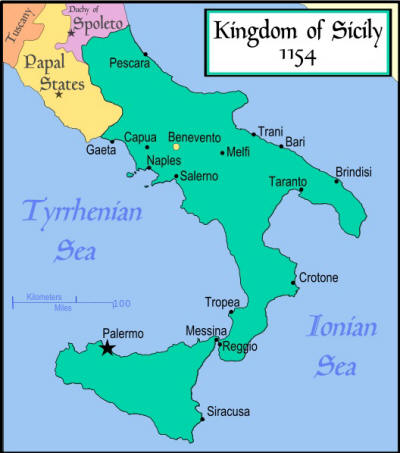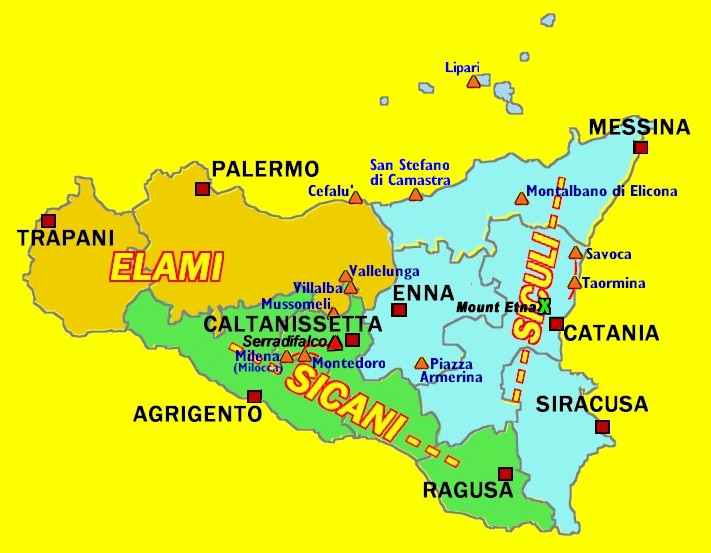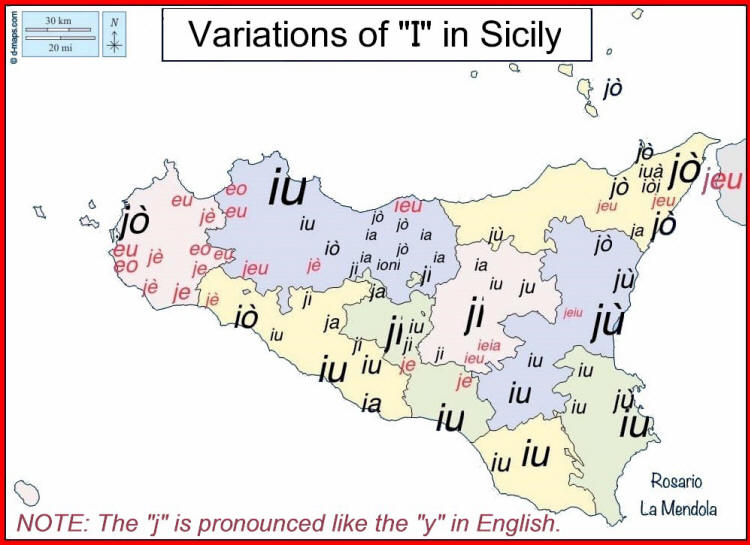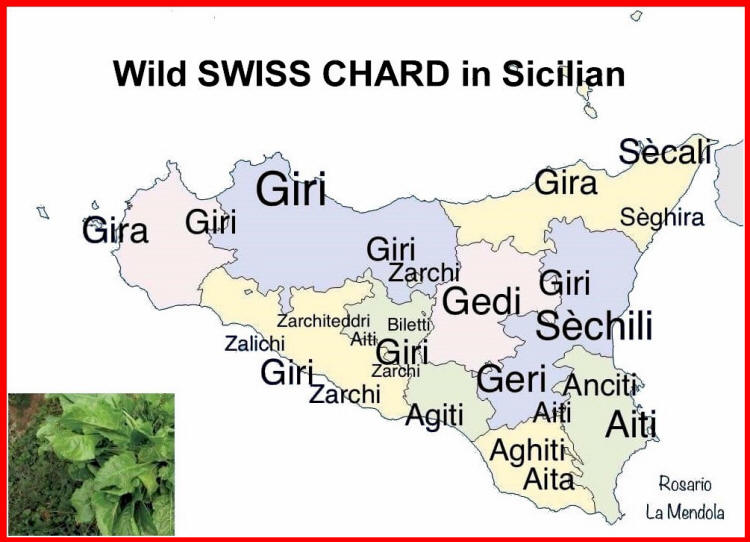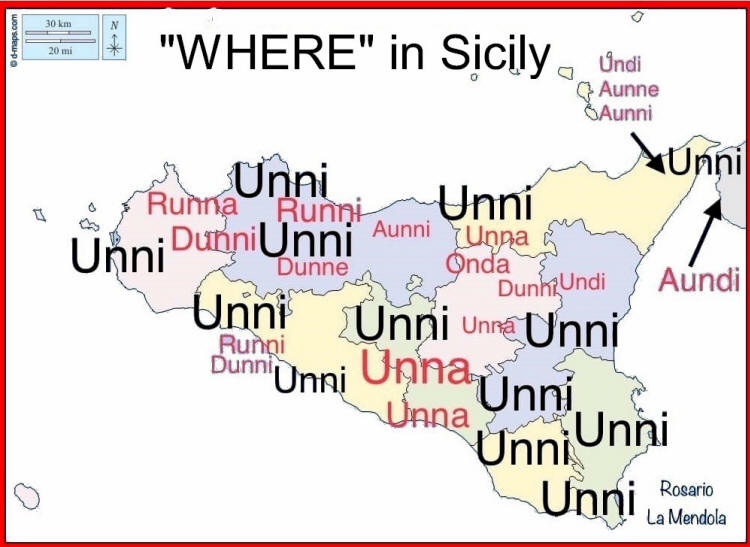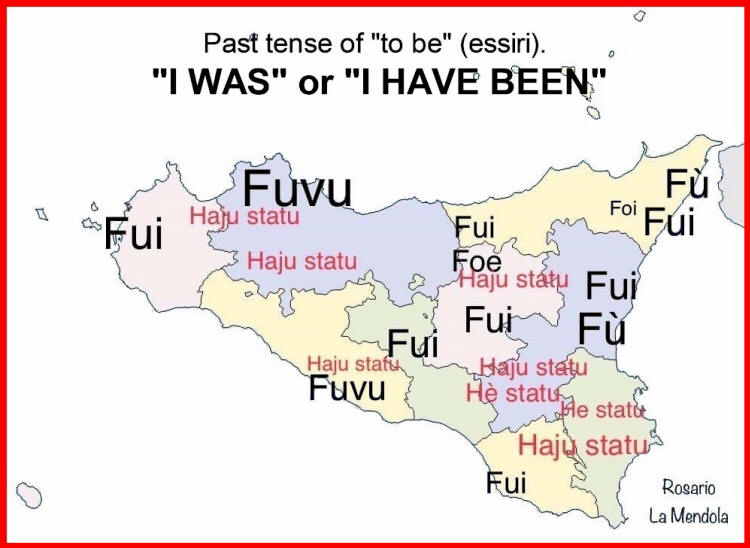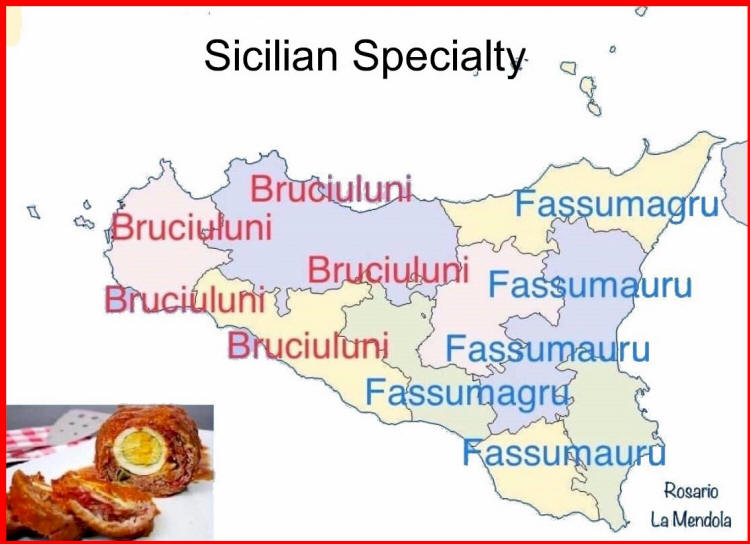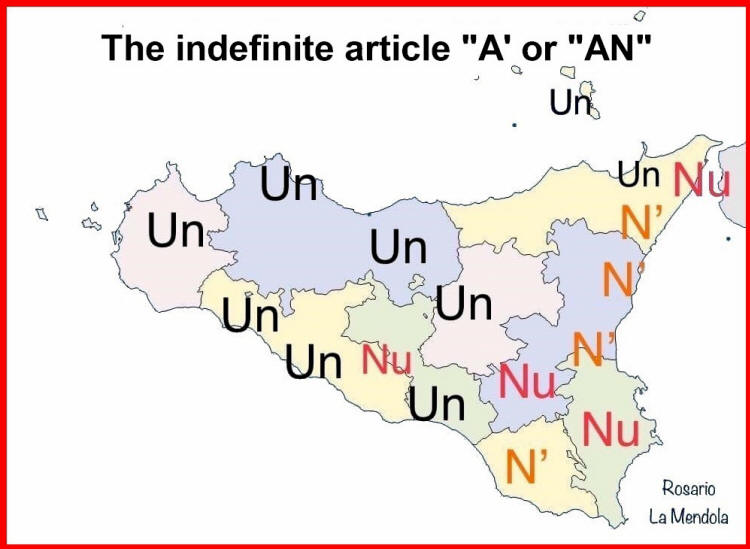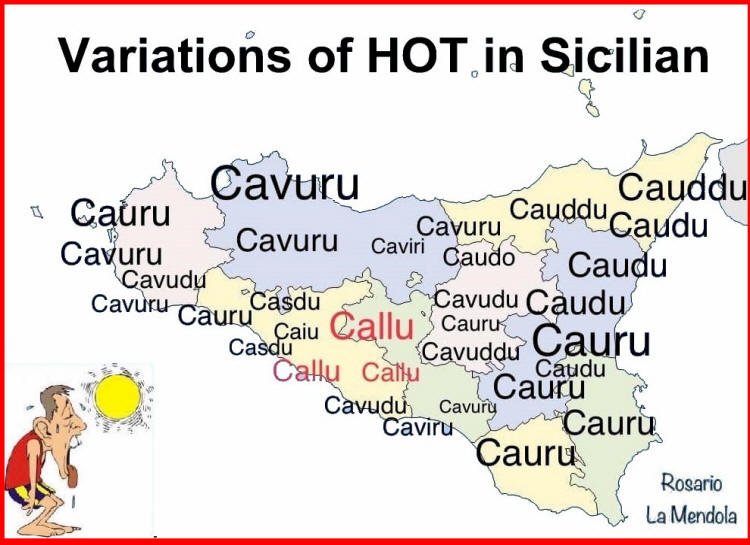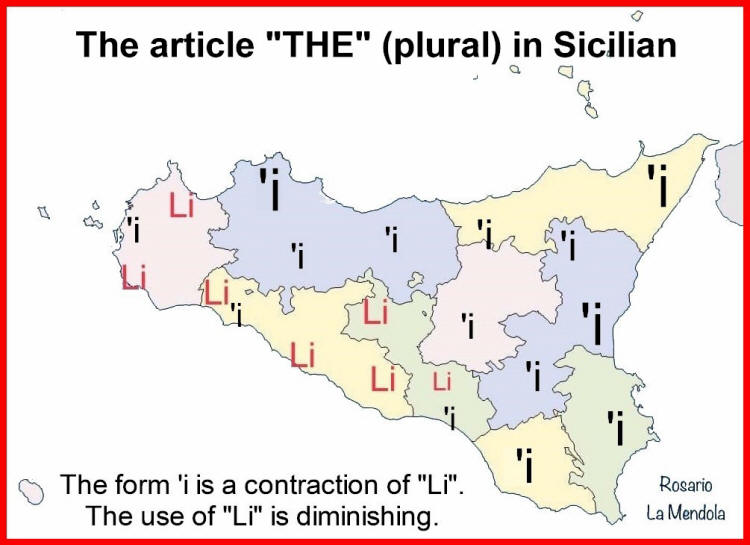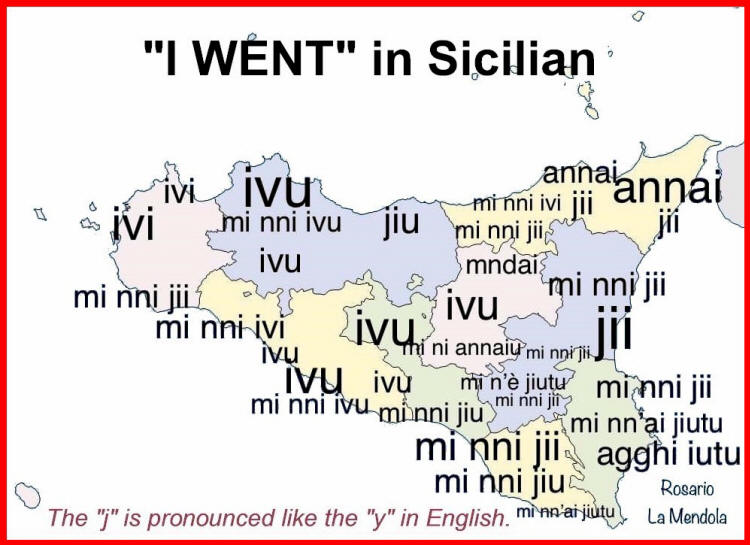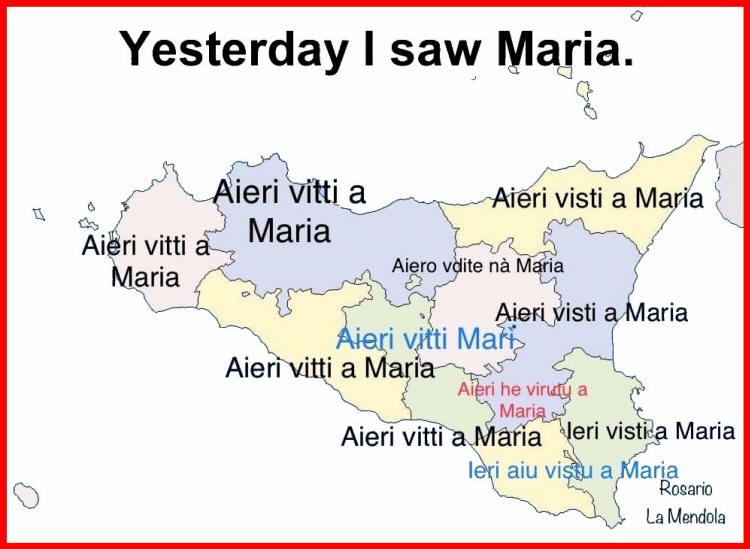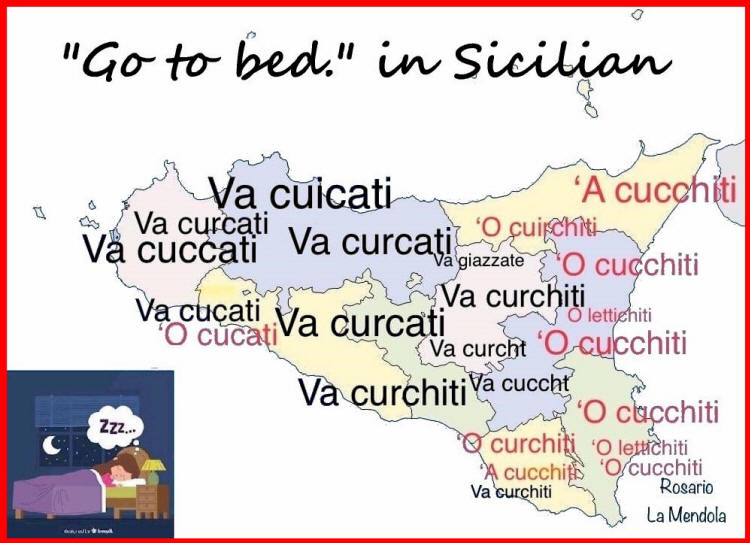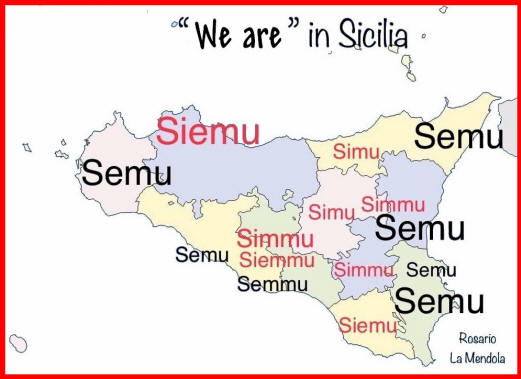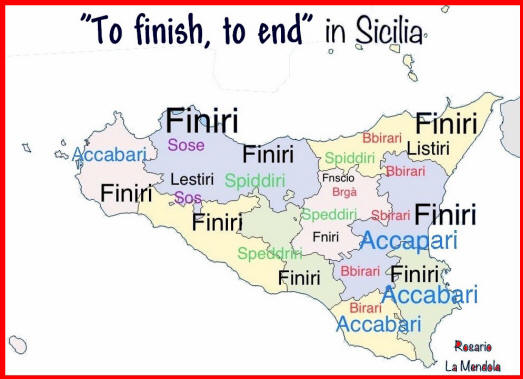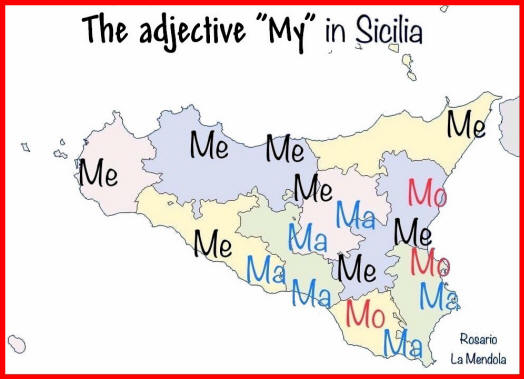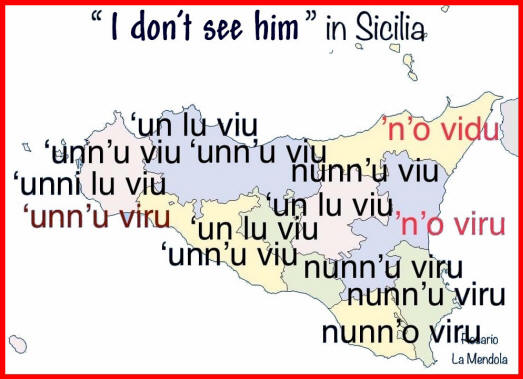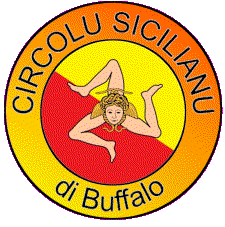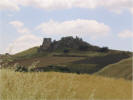|
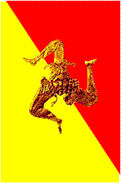 |
The Sicilian Language |
 |
|
GOOGLE TRANSLATE NOW INCLUDES SICILIAN!! |
|
Click HERE >>>
PARLA SICILIANU, LA LINGUA DI TO PA! |
Because there are so many dialects of
the Sicilian language, Sicilian-to-English may not yield what you want,
since your dialect may be different than the version used in
Google Translate. Another factor is that as Sicilian has evolved,
modern speakers tend to merge or shorten sounds*; also, some words tend
to be 'Italianized'**; and others are completely different***. But
English-to-Sicilian will get you a translation that would be understood
by most Sicilians.
|
SOME EXAMPLES |
|
Google Translate
uses: |
Meaning |
I
use: |
|
*acceddu |
bird |
anciddu |
| *dû |
of the |
di lu |
| *figghiu/a |
son/daughter |
figliu/a |
|
***grembiuli |
apron |
fallaru |
| *i,
a, u |
the |
li, la, lu |
|
*parra |
speak, talk |
parla |
|
picciriddu |
child |
picciliddu |
| **scappò |
escaped |
scappà |
|
**supra |
on |
ncapu |
|
**supra |
upstairs |
susu |
| **turnò |
returned |
turnà |
|
***vistitu |
dress |
falletta |
|
vistitu |
suit |
vistitu |
| *vugghiu |
I want |
vugliu |
|
vuiautri |
you (plural) |
vuantri |
| |
|
|
|
| |
«Omeru nun scrissi pi grecu
chi fu grecu, o Orazziu pi latinu chi fu
latinu? E siddu Pitrarca chi fu
tuscanu nun si piritau di scrìviri pi
tuscanu, pirchì ju avissi a èssiri evitatu,
chi sugnu sicilianu, di scrìviri 'n
sicilianu? Haiu a fàrimi pappagaddu di
la lingua d’àutri?»
(Antoniu Venezianu: Murriali, 7 Jinnaru 1543
- Palermu, 19 Austu 1593)
"Didn't Homer
write in Greek because he was Greek, and
Horatio write in Latin because he was Latin?
And if Petrarch who was Tuscan was not
afraid to write in Tuscan, why should I, who
am Sicilian, be shunned for writing in Sicilian?
Must I make myself a parrot for the language
of others?"
(Antoniu
Venezianu [Antonio Veneziano]: Monreale,
7 January 1543, Palermo 19 August 1593) |
Many souls,
even Sicilians and those of
Sicilian descent, have the same
misconception held by Italians
and non-Italians everywhere:
that "Sicilian" is simply a
different, "cruder" form of the
Italian language. Nothing
could be further from the truth.
While today's Italians and
sadly, today's Sicilians, are
told "by those that know" that
Sicilian is the language of the
poor or ignorant, the Sicilian
LANGUAGE was the first "Romance"
language to develop from Latin,
the early language of state.
As such, it includes not only
words derived from Latin roots
(as did the Italian "Tuscan"
Florentine dialect which became the
official Italian language), but
it has rich inclusions from the
tongues of the many occupiers of
Sicily, including Carthaginian,
Greek, Arabic, French and
Spanish.
Sicilian was the language of poets, taught in the
Sicilian School of Roger the
Great a thousand years ago, but
it is not regularly taught in
Sicilian schools. If
you're an "Italian American",
the odds are good that your
immigrant ancestors, like the
majority of "Italian" émigrés
during the Great Migration,
were from Sicily, a
nation which once extended from
Naples and Abruzzo to Messina
and Palermo, and
that they spoke, not Italian,
but SICILIAN.
This page is inspired by the facebook group
"Speak Sicilian" (http://bit.ly/LearnToSpeakSicilian),
where you can read or
write in the Sicilian
language;
ask how to say an English word or phrase in
Sicilian;
ask what a Sicilian
word means in English;
or learn (or teach) Sicilian.
Vowels in the Sicilian language
have the following sounds
(phonetics are in English):
A is “ah”;
E is “eh” (“long
a”); I is “ee”;
O is “oh” (“long
o), and U is “oo”. “A, E, I, O,
U” in Italian is “ah, eh, ee, oh, oo”!! The English
sound of I (“long i” as in “eye”) is given by the combination “ai”
in Sicilian. Sicilian has no letter "k", "y" or "w".
It has a letter written like "j", but this "j" is a
'long-tailed' form of the
letter "i", and is pronounced as we would pronounce "y" in English.
In
Sicilian spellings, "c",
if it is followed by "a", "o" or
"u", is
pronounced like the English "k"; but
if it is followed by an "i" or
"e", then "c" is pronounced like
the English "ch" (as in
"church"). Double "cc"
is also pronounced as the
English "K".
"ch" in
Sicilian is NOT pronounced as in
English, but sounds like the
English "k". So
my cousins, the Miccichè
family, pronounce their surname
"mee-chee-KAY".
Similarly, "g" is pronounced as
in the English "good" if
followed by "a", "o" or "u"; but
"g" is pronounced like the
English "j" (as in "George") if
it is followed by an "i" or "e".
In Sicilian pronunciation, the
"g" sound at the start of words
is often "swallowed", and
sometimes also the middle of
words. The "g" is silent
when followed by the consonant
"l".
The
consonant "z" at the start of a
word is generally pronounced as
in English, while "zz" is
pronounced "tz" as in "pizza".
There is no "j", as such, in the
Sicilian language.
When the letter "i" has the
sound a "y" has in English, it
is written with a tail and
looks like a "j" but
it is not pronounced like
the English "j". For
example: "jiri"
(English phonetics: YIH-rih);
"jiurnu" (YOUR-noo); "saju"
SIGH-you) etc. |
|
|
|
To hear spoken Sicilian, click
below. Presented are some common words,
phrases and prose, written and spoken in the
Sicilian language, with English translation. I
disagree with the contraction of the articles "li",
"la" and "lu" (meaning "the") to "i",
"a", and "u". That, I believe is a
modern 'Italianization'. My family and acquaintances
(serrafarchisi) always said li, la,
and lu.
|
|
SPOKEN SICILIAN |
|
Is Sicilian a 'Dialect'? |
Some
(generally Northern Italians)
try to imply that Sicilian is
simply a dialect of the Italian
language. The Italian
language itself was once a
dialect, Toscano, or
Tuscan, which was one of many
Apennine peninsula dialects that
developed from Latin.
Many modern day languages trace their origins to the Latin
spoken in ancient Rome.
These are the 'Romance'
languages, which include Tuscan (Italian);
Spanish; Portugese; French; and
Rumanian.
But there is strong evidence that the first
Romance language to develop from
Latin was the Sicilian
language.
I'm not a trained linguist, and my knowledge of Tuscan is
book-learned, while I learned
Sicilian at my mother's knee.
However, I'm a self-taught
student of languages, and my
education as an engineer has
taught me to have a curiosity
for how all things have
developed. When words are
considered in their Latin origin
and then compared in Sicilian
and Italian, the words seem
to me to have clearly progressed from
Latin to Sicilian, to Italian. In some cases, Italian words
bear no likeness to Latin
and Sicilian words that are
clearly related.
In Latin, "brother" is frater (FRAH-tehr); in Sicilian, it's
frati (FRAH-tih).
In Tuscan/Italian, it's fratello
(fruh-TELL-oh). I
seriously doubt that the word
went from frater to
fratello to frati; it
seems clear that the progression
was from Latin to Sicilian to
Tuscan. The same can be
said for the words for "sister":
Latin soror, Sicilian
soru, Tuscan sorella.
The Latin verb "to go" is
'ire'. In Sicilian,
it's 'jiri', in Tuscan
it's 'andare'. The
Latin verb "I come" is 'venio';
Sicilian 'veniu'; Tuscan
'vengo'. Which
language came first?
In Latin, as in Sicilian and Tuscan, many nouns have masculine or
feminine endings. Latin's
endings are "us" (oos) for the
masculine and "a" (ah) for
the feminine. Again, to
me, it seems much more likely
that the many Sicilian masculine
nouns that end in "u" (oo)
derive directly from Latin, and
that the Tuscan masculine ending
of "o" came later.
Examples are "rabbit": Latin
cuniculus, Sicilian
cunigliu, and Tuscan
coniglio; and "son"; Latin
filius, Sicilian
figliu, and Tuscan figlio.
In my youth, I mistakenly thought that ny
parents pronounced the 'Italian'
sound of "o" as "u".
After serious reconsideration, I
believe that in fact, the
Tuscan and Italian
pronunciation changed, devolving
the original Latin (and
Sicilian) "u" to
sound like "o".
Other words (presented in the order Latin, Sicilian, Tuscan) show
similar evolution: "wife":
mulieri, muglieri,
moglie; and "how":
quomodus, comu,
come.
And then there are words for which the Sicilian is clearly derived
from the Latin, while the Tuscan
appears to have come from a
completely different source.
In Latin, the verb "to go" is
ire (IHR-eh); in Sicilian,
it's jiri (YIHR-ih); but
in Tuscan/Italian, it's
andare. In Latin, the
pronoun "he" is illus,
Sicilian iddu, but in
Tuscan it's lui; and
"she" is illa in Latin,
idda in Sicilian, but
lei in Tuscan!
This concordance is made undeniable to me by the most
'Sicilian' of words,
unni, from the Latin
"unde", meaning "where".
There
is a
Sicilian language,
older than
and distinct
from the
'Italian'
language,
which is
actually the
Tuscan dialect which
was
developed by
Dante
Alighieri,
with
elements
which
originated
in the
Sicilian
language.
Dante was a
member of
the Sicilian
School of
poetry
before he
organized
the Tuscan
dialect.
That
being said,
the Sicilian
language
does have regional
dialects
that vary
among the
provinces of
Sicily, and
even between
the towns
and cities
of any
specific
province.
Unfortunately,
because for
years,
'Italian'
has been
taught in
Sicilian
schools, and
because of
the
influence of
'Italian'
newspapers,
radio and
TV, Sicilian
is spoken
less and
less in
Sicily.
This
situation is
further
aggravated
because
'Italians'
mistakenly
assume that
the Sicilian
language is
a 'poor
man's
version' of
'Italian',
and many
Sicilians
feel there
is a stigma
associated
with
speaking
their own
language!
However,
the elderly
still speak
it, mostly
at home, and
many public
schools are
now required
to have
courses in
the Sicilian
language.
The Sicilian words given below are as I learned them from parents
who left Sicily over a hundred years
ago. As such they reflect
the language as it was spoken in
Sicily around the beginning of
the 1900s, which was not much
modified by incursions of the
Tuscan dialect that the
'Risorgimento' imposed on
Sicily. I believe its
'purity' was also enhanced by
the fact that Serradifalco is
and was a small interior town
having limited contact with
speakers of Tuscan, or the
modified Sicilian dialects of
other regions. Language
scholar Alissandru Caldiero,
author of
Grammar of the Sicilian Language,
has informed me that my Sicilian
(that is, my parents'
Sicilian) resembles the language
spoken at the court of Frederick
II. |
|
|
|
The Sicilian words below are as I learned them as a
first language from my parents, who spoke the language as it was use in
the early Twentieth Century in Serradifalco, Caltanissetta Province,
Sicily.
NOTE: For pronunciation of these Sicilian words, and more, go to
the later section below, entitled "Sicilian Words" |
|
Meaning |
Latin |
Sicilian |
Italian |
|
above |
supra |
ncapu |
sopra |
|
aid |
succursu |
succursu |
soccorso |
|
apple |
pomum |
pumu |
mela |
|
artichoke |
cactus |
caccuciula |
carciofo |
|
before |
ante hora |
antura, andura |
primo fa |
|
below |
subtus |
suttu |
sotto |
|
brother |
frater |
frati |
fratello |
|
burdock |
carduum |
carduni |
cardo |
|
cap (hat) |
petasus |
tascu |
capello |
|
cheek |
maxilla |
masciedda |
guancia |
|
cherry |
cerasus |
cirasu |
ciliegia |
|
to close,
shut |
claudere |
chiuieri |
chiudere |
|
I
come |
venio |
veniu |
vengo |
|
cough |
tussis |
tussi |
tosse |
|
cow |
vacca |
vacca |
mucca |
|
dirty |
luteus |
ludiu |
sporco |
|
a drop, a bit |
stilla |
stizza |
goccia |
|
downstairs |
deorsum |
iusu |
giu, di sotto |
|
empty |
vacuus |
vacanti |
vuoto |
|
to
extinguish, turn off |
extutare |
astutari,
stutari |
spengere |
|
father |
pater |
patri |
padre |
|
to
fix |
exserciare |
azzizzari |
aggiustari |
|
from |
de |
di |
da |
|
to give |
donare |
dunari |
dare |
|
to
go |
ire |
jiri |
andare |
|
good |
bonus |
bonu |
buono |
|
grape |
acinus, uva |
racina |
uva |
|
half |
medius |
mezzu |
metà |
|
haste, hurry (noun) |
pressa |
prescia |
fretto |
|
I have |
habeo |
haiu |
ho |
|
he |
illus |
iddu |
lui |
|
hello |
salve |
saluti |
ciao |
|
here |
hac |
ca |
qua |
|
horse |
cavallus |
cavaddu |
cavallo |
|
how |
quomodo |
comu |
come |
|
I |
ego |
iu |
io |
|
juice, sauce |
sucus |
sucu |
sugo |
|
I
know |
scio |
saju, sacciu |
so |
|
leaf |
pampinus |
pampina |
foglia |
|
leather |
corio |
curiu |
cuoio |
|
long |
longus |
lungu |
lungo |
|
mother |
mater |
matri |
madre |
|
new |
novus |
nuvu |
nuovo |
|
no one |
nullus |
nuddu |
nessuno |
|
peach |
persicum |
pirsica |
pesca |
|
pear |
pirum |
piru |
pera |
|
rabbit |
cuniculus |
cunigliu |
coniglio |
|
to rise, stand up |
surgere |
susiri |
alzare |
|
sauce, juice |
sucus |
sucu |
sugo |
|
scissors |
forfex |
forfici |
forbici |
|
she |
illa |
idda |
lei |
|
soft |
mollis |
muddu |
morbido |
|
sister |
soror |
soru |
sorella |
|
son |
filius |
figliu |
figlio |
|
sweet |
dulcis |
duci |
dolce |
|
to swim |
natare |
natari |
nuotare |
|
that |
quod |
chiddu |
quello |
|
then |
tum |
tannu |
poi |
|
there (near) |
illac |
dda |
là |
|
there (far) |
illuc |
dducu |
là |
|
this |
hoc |
chistu |
questo |
|
tree |
arbor |
arbulu |
albero |
|
upstairs |
sursum |
susu |
di sopra |
|
where |
unde |
unni |
dove |
|
where is |
unde est |
unni
è |
dov'è |
|
what |
quid est |
chi |
cosa |
|
who |
cuius |
cu |
chi |
|
wife |
mulier |
muglieri |
moglie |
|
with |
cum |
cu |
con |
|
wood |
lignum |
lignu |
legno |
|
|
|
|
Students of language report
that Dante Alighieri, the
medieval poet, was greatly
influenced by the language that
had been spoken at the court of
Sicily's Frederick II, namely
the Sicilian tongue that was
studied and written at the
famous Sicilian School.
Dante is credited with polishing
the Tuscan dialect, doing so
with words and ideas adapted
from the Sicilian School
and its language. For
example, the sonnet, a form of
poetry unknown before
Frederick's reign, evolved in
Sicily, only to become a major
form of poetry throughout not
only Italy, but the world.
Sicilian is a
LANGUAGE, that is true;
however, like many other
languages, it has different
dialects within it, that
have developed in various
regions of Sicily and in the
south of the Apennine peninsula.
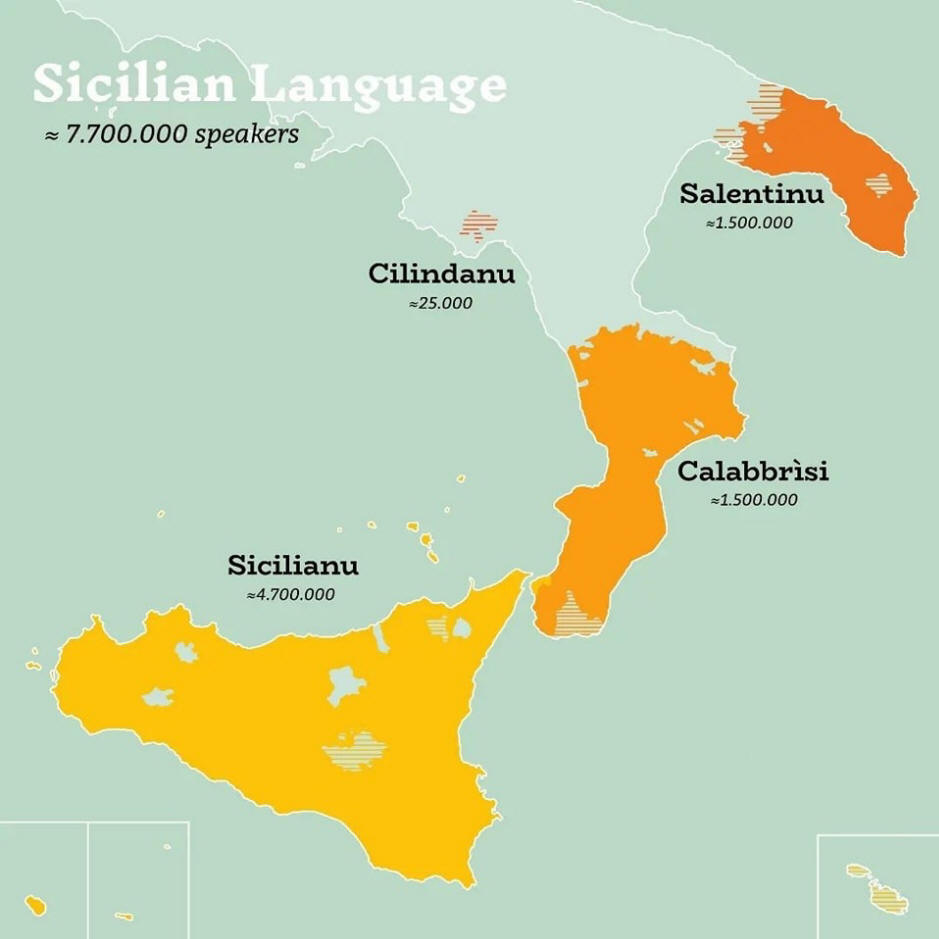
Below is a vocabulary of English words and their meanings in
Sicilian, with variations for
the dialects of several towns or
regions. It appears that
in central Sicily, in
Caltanissetta province, northern
Agrigento province and eastern
Palermo province, the classic
Sicilian language still prevails
as it was spoken in the court of
Frederick II. This is
characterized by words like
figliu (son) and cunigliu
(rabbit), which in dialects
elsewhere have become figghiu
and cunigghiu; and
especially lu (masculine
'the'), la (feminine
'the') and li (plural
'the), which in dialects have
devolved into u, a
and i.
This
position is corroborated
by
Sicilian linguist
Rosario La Mendola, who
notes that outside of a
central area of Sicily,
the language has been
'contaminated' by modern
usages and
pronunciations, as well
as by Italianization.
He explains that
"in a loosely-defined
area of central-southern
Sicily, in the
hinterland of the
provinces of Agrigento,
Caltanissetta and part
of that of Enna, the
local dialects have some
particularities when
compared with Standard
Sicilian or with those
spoken in other areas of
the Island."
La Mendola's map shows
the
'Area of least
contamination of the
Sicilian language'.
My ancestral village,
Serradifalco, is at the
center of this area, and
my dictionaries reflect
that least-contaminated
area, where
'la lingua antica'
(the ancient language)
was spoken by my
parents.
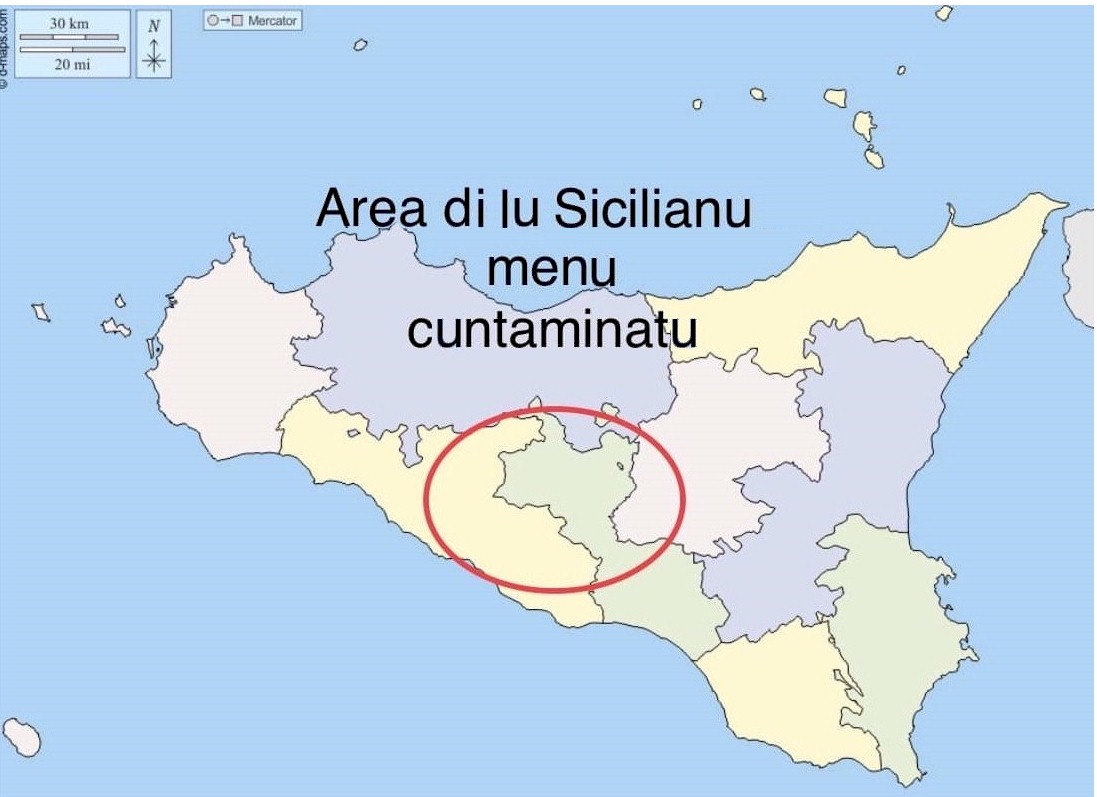
These differences from
the dialects more
reflective of today's
'Standard Sicilian'
include, in La Mendola's
opinion:
- the
failure to transform the
Latin syllables LIU or
LEU, as for FILIUS, son,
or OLEUM, oil, into GGHI,
or FIGLIU and OGLIU
instead of the usual
FIGGHIU and OGGHIU;
- CALLU,
for Hot, very similar to
the Latin Calidus,
instead of CAUDU or
CAURU in the more common
Sicilian;
- MIDEMMA
or similar words, all
derived from the Latin
IDEM, instead of PURU
and MACARI for ALSO;
- FRACICA
or FRACI instead of PÒ
ESSIRI for FORSE in many
places in the Nisse (Caltanissetta)area;
- the
greater sonority of the
palatal plosive ɖɖ
present in BEDDA, CHIDDU,
DDÀ so much so that it
is often indicated with
BEDDRA, CHIDDRU, DDRÀ,;
- the
almost exclusive use of
the definite articles LU
and LI, for IL, LO, I
and GLI, in their
original and
uncontracted form, or
with U and I, as instead
happens in most of
Sicily;
- the
retropalatal and
slightly aspirated
pronunciation of the
initial syllables in FL
of terms originating
from Latin or Vulgar
indicated, arbitrarily,
with XHIUMI from Flumen,
FIUME, XHIURI from Flos
Floris, FIORE, XHIATU
from Flatum, FIATO etc.;
- the
almost total absence of
the ASSIMILATION of the
previous consonant,
PORTA remains as such,
it does not become POTTA,
as now happens in most
of Sicily.;
- the
almost total absence of
ROTACISM which, in this
case, changes the
consonant D with R, a
phenomenon also typical
of the Neapolitan
dialect. In this area,
in fact, we say DUNCI (DUCI)
instead of the
widespread RUCI for
Dolce and rotacism is
NEVER applied in the
conjugation of the verbs
DIRI, RIDIRI, VIDIRI
etc.;
Many of
these elements could
lead to the conclusion
that the dialects spoken
in the hinterland of the
aforementioned
central-southern
provinces of the island
are those that
have
preserved to a greater
extent the original
characteristics of
medieval Sicilian.
|
I invite all Sicilians and all
those of Sicilian descent to
e-mail me, to add your own
versions of these words.
Please identify them by region,
and add as many English words
you like, with their Sicilian
equivalents.
AFConiglio@aol.com
|
|
Viva la lingua Siciliana!!! |
|
|
|
|
Sicilian Words
The
words in serrafarchisi
represent the language spoken in
the central part of Sicily at
the beginning of the twentieth
century.
In small interior villages, the
influences of the outer world,
including Italian and foreign
visitors and media, were not as
great as in large cities, or
those on the coastlines.
Except in cases where a different
word entirely is used, the
versions shown below for other
towns are regional
pronunciations
of the basic language. For
example, Sicilian for 'beautiful
is 'bedda', which is
pronounced
'beddra' in several localities.
I can't list all variations from
every town here. I've
combined sciacchatanu
and raccamutisi,
similar variations from towns of
Agrigento province. Thanks to
Santo Barbieri
for the raccamutisi
words; Giovanni
Iachelli
for the sirausanu;
Patrick Pregiato
for the missinisi;
and special thanks to
Danilo Proietti for
the extensive list of
palermitanu.
To use the table, remember the pronunciation guide given above.
To assist with the
pronunciation of Sicilian words,
I have used
Google
Translate.
Many Sicilian words, if spelled
correctly, can be entered there
as Italian, Spanish or Romanian
words. After entering a
word, the "speaker" icon can be
pressed and the input word will
be pronounced (have your sound
on). Click on any "serrafarchisi"
word below, then click the
speaker icon that appears on the
Google
Translate
page. Pay no attention to the
English translation shown, it's
not relevant.
In some cases, I have had to
enter a word with phonetic
changes to get the pronunciation
closest to Sicilian. The
Sicilian words in the lists
below can be clicked on to take
you directly to the word on
Google Translate.
.
Many of the pronunciations are spot-on, but
some are only approximations.
The available languages can't
deal with the leading "n" in
words like "ncapu" or the
leading long-tailed "i" (written
as a "j"):
"Chiú
migliu di nenti!"
(Better than nothing!)
 |
|
|
| In English |
serrafarchisi
(Serradifalco) |
sirausanu
e catanisi
(Siragusa
& Catania) |
missinisi
(Messina) |
palermitanu
(Palermo) |
altavillisi
(Altavilla) |
sciacchatanu
e
raccamutisi
(Sciacca, Racalmuto) |
|
above |
ncapu |
|
|
|
|
|
| also,
as well |
medemma |
|
|
puru |
|
|
| also,
too |
puru |
|
|
puru |
|
|
| verb:
I am |
sugnu |
|
|
sugnu |
|
|
|
verb: to annoy |
annuiari |
|
|
annuiari |
|
|
|
adjective: annoying |
cammurusu |
camurriusu |
|
camurriusu |
|
cammurusu |
|
ant |
formícula |
furmicula |
|
furmicula |
|
|
|
apple |
pumu |
|
|
puma |
|
|
| verb:
they are |
sunnu |
|
|
sunnu |
|
|
verb:
to arise
to stand up |
susiri |
|
|
susiri |
|
|
|
artichoke |
caccuciula |
|
|
caccociula |
|
|
|
ball |
palla |
|
|
palluni |
|
pallun |
|
banquet |
banchetta |
|
|
vanca |
|
pallun |
|
barrel |
varliri |
|
|
vutte |
|
pallun |
| basket |
panaru |
|
|
|
|
|
| verb:
to be |
jèssiri |
|
|
essiri |
|
|
|
beautiful (feminine) |
bedda |
bedda |
bedda |
biedda |
|
beddra |
| before |
andura |
|
|
antura |
|
|
| below |
suttu |
|
|
sutta |
|
|
| better |
migliu |
megghiu |
megghiu |
megghiu |
|
|
|
bird |
anciddu |
aceddu |
aceddu |
acieddu |
aceddu |
|
| a little
bit |
tantícchia |
tantícchia |
|
antícchia |
|
|
| black |
niuru |
niuru |
|
nivuru |
|
|
|
blanket |
cutunina |
cuperta
currunina |
|
cuperta |
|
|
| verb:
to bless |
benediciri |
|
|
beniriciri |
|
|
|
[sir, ma'am] bless me |
sabenedica |
|
|
sabbinirica |
|
|
| blue |
blu |
blu |
|
blu |
|
|
|
blouse, shirt |
cammisa |
|
|
|
|
|
| verb:
to blow |
sciusciari |
|
|
sciusciari |
|
|
|
boy |
carusu |
carusu |
|
picciutteddu |
|
|
|
boy,
little |
piciliddu |
piccirriddu |
piccirriddu |
piccirriddu |
|
|
|
boy,
teen |
piciuttu |
piciottu |
|
piciotto |
|
|
|
breakfast |
mangiari di matina |
|
|
culazioni |
|
|
|
brother |
frati |
|
|
u
frati |
|
|
|
bruschetta |
bruschetta |
|
|
a
bruschetta |
|
|
|
brutish, ugly |
bruttu
ladiu |
|
|
ladiu |
|
|
|
verb: to buy |
'ccattari |
accattari |
|
accattari |
|
cattari |
|
cap
(hat) |
tascu,
capiddu |
|
|
capeddu |
|
|
|
carpet |
trappitu |
tappitu |
|
tappitu |
|
|
|
celery |
accia |
|
|
la
accia |
|
|
| verb:
to change |
cangeri |
|
|
|
|
|
|
cheese |
tummazzu |
tummazzu
furmaggiu |
|
furmaggiu |
|
|
| verb:
to chop |
capuliari |
|
|
tagghiuzzari
capuliari |
|
|
|
verb: to clean |
limpiari |
|
|
|
|
|
| verb:
to close |
chiuiri |
|
|
chiuiri |
|
|
| closet |
cammarinu |
|
|
|
|
|
| coffee |
cafè |
cafè |
|
cafè |
|
|
| cough |
tussi |
tussi |
|
tussi |
|
|
| cow |
vacca |
|
|
|
|
|
| verb:
to cover |
cumigliari |
|
|
cummigghiari |
|
|
| cover,
lid |
crupicchiu |
|
|
cuperchiu |
|
|
| covered |
cumigliatu |
|
|
cumigghiatu |
|
|
| verb:
to crush |
scacciari |
|
|
scacciari |
|
|
| verb:
to cry |
chiàngiri |
chiàngiri |
|
chiàngiri |
|
|
|
cupboard |
stipu |
stipu |
|
stipu,
stipettu |
|
|
| verb:
to curse |
bastemmiari |
|
|
bistimiari |
|
|
|
daughter |
figlia |
figghia |
figghia |
figghia |
|
|
| day |
jurnu |
jornu |
jurnu |
jornu |
|
|
| dirty |
ludiu
lurdu |
|
|
lurdu |
|
|
|
dust, dirt |
stirru |
|
|
|
|
|
| verb:
to do |
fari |
|
|
fari |
|
|
| verb:
to do chaotic things* |
cuminiari |
|
|
|
|
|
| donkey |
sceccu |
sceccu |
|
sceccu |
|
|
|
downstairs |
iusu |
|
|
iusu |
|
|
|
dust, powder |
pruvulazzu |
|
|
|
|
|
|
dresser |
cantaranu |
cantaranu |
|
cantaranu |
|
|
|
noun: a drop, a bit |
'na
stizza |
|
|
|
|
|
| ear |
oricchiu |
aricchia |
|
aricchiu
aricchia |
|
|
|
earlier |
andura |
|
|
antura |
|
|
| verb:
to eat |
mangiari |
mangiari |
manciari |
manciari
pistiari |
|
|
|
eggplant |
milingiana |
milingiana |
|
mulinciana |
|
|
|
empty |
vacanti |
|
|
vacanti |
|
|
| verb:
to fall |
lavancari |
cascari |
|
allavancarfiniri |
|
|
| father |
patri |
|
|
patri |
|
|
| feet |
pidi |
peri |
|
peri |
|
|
| fig
cookie |
puccidata |
viscotta di ficu |
pucciddata |
cucciddatu/a |
cuccinnata |
|
| finger |
jitu |
itu |
|
iritu/irita |
|
|
|
fingernail |
ugnu |
ugnu/ugna |
|
ugnu/ugna |
|
|
|
verb: to
finish |
speddiri |
|
|
finiri |
|
|
|
flat
(adjective) |
chiattu |
|
|
|
|
|
|
flower
|
sciura |
|
|
|
|
|
|
flowers
(plural) |
sciuri |
|
|
|
|
|
| verb:
to fold |
gnuticari |
gnutticari |
|
gnutticari |
|
|
| folded |
gnuticatu |
gnutticatu |
|
gnutticatu |
|
|
| fork |
furcetta |
furcetta
furchetta |
|
furchetta |
|
|
| frog |
giurana |
|
|
giurana |
|
|
| verb:
to fool around |
babbiari |
babbiari |
|
babbiari |
|
|
| foot |
pidu |
peru |
|
pere |
|
|
| from |
di |
di, da,
du |
|
ri, ra,
ru |
|
|
| verb:
to fix |
azzizzari |
cunzari |
|
azzizzari |
|
|
| girl |
carusa |
carusa |
|
picciutedda |
|
|
| girl,
little |
picilidda |
picciridda |
piccirridda |
picciridda |
|
|
| girl,
teen |
piciotta |
piciotta |
|
picciota |
|
|
| verb:
to give |
dari |
|
|
runari |
|
|
| verb:
to go |
jiri |
iri |
annari |
iri,
annari |
|
|
| verb:
(let's) go |
ammunnini |
ammunini |
annammunini |
amuninni |
|
ammunini |
| goat |
crapa |
crapra,
crapa |
|
crapa |
|
|
| verb:
to grab to grasp |
afirrari,
'firrari |
|
|
|
|
| verb:
to grab to catch |
acchiappari, 'chiappari |
|
|
|
|
| grape |
racina |
racina |
|
racina |
|
ragina |
| green |
virdi |
virdi |
|
virdi |
|
|
| verb:
to grind |
capuliari |
|
|
capuliari |
|
|
| ground
meat |
capuliatu |
|
|
capuliatu |
|
|
|
habit
(bad) |
vizziu |
viziu |
|
viziu |
|
|
|
hair |
capiddi |
|
|
capiddi |
|
|
|
half |
mizzu |
menzu |
|
menzu,
mezzu |
|
|
|
hammer |
martiddu |
marteddu |
|
marteddu |
|
|
|
handkerchief |
fazzulettu |
fazzulettu |
|
azzulettu |
|
|
|
handsome (masculine) |
biddu |
beddu
bidduni |
biddu |
beddu |
|
|
verb:
to hang
(e.g., laundry) |
stinniri |
|
|
stenniri |
|
|
|
hassle |
camurria |
|
|
|
|
|
| he |
iddu |
iddu |
|
iddu |
|
|
| here |
cca |
cca |
|
'cca |
|
|
| verb:
to hide |
ammucciari |
|
|
ammucciari |
|
|
| hole |
pirtusu |
pirtusu |
|
pirtusu |
|
pitusu |
|
How are you? |
Comu si? |
|
|
|
|
|
| hurry
(noun) |
prescia |
|
|
prescia |
|
|
| I |
iu,
ji (yih) |
|
|
iu |
|
|
| I
am well. |
Bunu sugnu! |
|
|
iu |
|
|
| verb:
he or she is |
jè (yeh) |
jè (yeh) |
|
è |
|
|
| jacket |
bunaca |
|
|
bunaca |
|
|
| key |
chiavi |
chiavi |
|
chiavi |
|
chiavi |
|
kidneys |
rini |
rini |
|
rini |
|
|
|
verb: to kiss |
vasari |
|
|
|
|
|
| knee |
ghinucchiu |
rinocchiu |
|
rinocchio |
|
|
| knife |
cutiddu |
cuteddu |
|
cuteddu |
|
cutteddru |
| verb:
to knock |
tuppiari |
tuppuliari |
|
tuppuliari |
|
|
| verb:
to know |
sapiri
canusciri |
|
|
sapiri
canusciri |
|
|
| verb:
I know |
saju,
sacciu
|
|
|
sacciu |
|
|
| lamp,
light |
lumi
luci |
|
|
luci |
|
|
| later |
doppu |
|
|
roppu |
|
|
| lazy |
lagnusu |
|
|
lagnusu |
|
|
| leaf |
foglia
pàmpina |
fogghia |
|
fogghia |
|
|
| to
lean/place (verb) |
puiari |
|
|
appuiari |
|
|
| leather |
curiu |
|
|
coriu |
|
|
|
verb: to light |
addrumari |
|
|
alluminari |
|
|
|
(it's)
likely (that) |
fracica |
|
|
|
|
|
|
verb: to look |
taliari |
taliari |
|
taliari |
|
|
|
lunch |
mangiari di mazziiurnu |
|
|
pranzu, manciari di
menzuiornu |
|
|
|
verb: to make |
fari |
|
|
fari |
|
|
|
verb:
to
melt |
squagliari |
squagghiari |
|
squagghiari |
|
|
| manicotti |
manicotti |
|
|
manicuotti |
|
|
| middle |
mezzu |
menzu |
|
menzu/mezzu
centru |
|
|
| mirror |
specchiu |
|
|
specchiu |
|
|
| mold |
muffu |
|
|
|
|
|
| moldy |
muffusu |
|
|
|
|
|
| money |
[g]rani |
|
|
|
|
|
| money |
sordi |
|
|
|
|
|
| mop |
pezza pi lavari nterra |
|
cannavazzu |
|
|
| more |
chiú |
|
|
chiú,
chiò |
|
|
| mother |
matri |
|
|
matri |
|
|
|
verb: to move aside |
arrassari |
allatiarisi |
|
arrassari |
|
|
| nail |
chiuvu |
chiovu |
|
chiovu |
|
chiovu |
| napkin |
serbietta |
tovagliolo
mappina |
|
mappina
serbietta |
|
|
|
verb: to neaten |
pulizziari |
|
|
|
|
|
| neck |
cuddu |
|
|
cuoddu |
|
|
| no one |
nuddu |
|
|
nuddu |
|
|
|
verb: to notice |
addunari |
|
|
|
|
|
| now |
camora
ora |
|
|
camora
ora |
|
|
| of |
di |
di |
|
ri |
|
|
| olive |
auliva |
|
|
alivi,
aliva |
|
|
| on |
ncapu |
|
|
'ncapu
supra |
|
|
| onion |
cipudda |
|
|
cipudda |
|
cipuddra |
| orange |
aranciu |
purtuallu |
|
aranciu |
|
|
| others |
antri |
iautri |
autri |
avutri,
autri |
|
|
| page |
fogliu |
fogliu |
|
fogghiu |
|
|
| paste,
tomato |
sarsina |
|
|
saissa |
|
|
| peach |
pirsica |
persica |
|
pèssica |
|
spergia |
peel,
skin
(noun) |
scorcia |
|
|
|
|
|
| pillow |
chiumazzu |
|
|
chiumazzu |
|
|
| pin,
straight pin |
spingula |
|
|
spingula |
|
|
| place
(noun) |
banna |
banna |
|
banna |
|
|
| place
(noun) |
pustu |
postu |
|
puostu |
|
|
| to
place (verb) |
mintiri |
mettiri |
|
mettiri |
|
|
| to
place/lean (verb) |
puiari |
|
|
pusari |
|
|
| plate |
piattu |
|
|
piattu |
|
|
| pliers |
tinaglia |
tinagghia |
|
tinagghia |
|
|
|
polenta (Sicilian style) |
frascàtula |
|
|
|
|
|
| pomegranate |
pumugranatu |
ranatu |
|
ranatu |
|
|
| poor |
puviru |
|
|
puvirui |
|
|
| poor
person |
mischinu |
mischinu |
|
mischinu |
|
|
| powder,
dust |
pruvulazzu |
|
|
|
|
|
| verb:
to
pretend |
fari finta |
fari finta |
|
fari finta |
|
|
| verb:
to
put down |
pusari |
|
|
pusari |
|
|
|
verb: to quarrel |
sciarriari |
sciarriari |
|
sciarriari |
|
|
|
verb:
to
rain |
chioviri |
chioviri |
|
chioviri |
|
|
| rabbit |
cunigliu |
cunigghiu |
cunigghiu |
cunigghiu |
|
|
| red |
russu |
russu |
|
russu |
|
russu |
|
verb: to regret |
pintiri |
|
|
pintiri |
|
|
|
ricotta |
ricotta |
|
|
ricuotta |
|
|
| rifle |
scupetta |
scupetta |
|
scupetta |
|
|
| rogue |
malandrinu |
|
|
malantrinu |
|
|
|
rotten |
purritu |
|
|
|
|
|
| rude |
maleducatu |
|
|
malarucatu |
|
|
| sauce,
tomato |
sarsa |
|
|
saissa pumaruoru |
|
|
| sauce,
tomato, with meat |
sucu |
|
|
sucu |
|
|
|
verb: to save |
sarbari |
|
|
saibbari |
|
|
|
verb: to save |
sparagnari |
sparagnari |
|
sparagnari |
|
|
|
verb: to speak |
parlari |
parrari |
parrari |
parrari |
|
|
|
scissors |
furfici |
furbici |
|
furbici |
|
|
| she |
idda |
idda |
|
idda |
|
|
| sheep |
picuredda |
pecura |
|
pecura |
|
|
| shirt,
blouse |
cammisa |
|
|
|
|
|
| shoe |
scarpa |
scarpa |
|
scarpa |
|
|
|
shoulders |
spaddi |
spaddi |
|
spaddi |
|
|
| verb:
to shout |
vanniari |
|
|
|
|
|
|
shovel |
sciàbula |
|
|
|
|
|
verb:
to shut,
turn off |
chiúiri
stutari |
|
|
chiúiri
astutari |
|
|
| sister |
suru |
|
|
soru,
soro |
|
|
| small |
nicu |
|
|
nicu |
|
|
| snails |
babalucci |
vavalucci |
|
babbalucci |
|
babalucci |
|
verb: to sneeze |
stranutari |
|
|
|
|
|
| son |
figliu |
figghiu |
figghiu |
figghiu |
|
|
| spider |
tarantula |
ragnu |
|
ragnu |
|
|
| spoon |
cucchiara |
cucchiaru |
|
cucchiaru |
|
|
| sprig |
spicchiu |
|
|
spicchiu |
|
|
| straw |
paglia |
pagghia |
|
pagghia |
|
|
|
verb: to stir |
riminari |
|
|
|
|
|
|
verb: to stop raining |
scampari |
|
|
|
|
|
|
verb: to stretch |
stinnichiari |
stinnichiari |
|
stinnichiari |
|
|
|
stupid, idiot |
babbu |
babbu |
|
scemu,
babbo |
|
bubbu |
| sugar |
zuccheru |
zuccuru |
|
zuccarru |
|
|
| summer |
stasciuni |
stati |
|
stati |
|
|
| Sunday |
duminica |
ruminica |
duminica |
ruminica |
|
|
|
supper |
mangiari di sira |
|
|
manciari ri sira |
|
|
|
verb: to swim |
natari |
natari |
|
natari |
|
|
| swiss
chard |
zarchi |
|
|
gira |
|
zarchi |
| table |
tavulinu |
tavulinu |
|
tavulu,
tavulinu |
|
|
| tail |
cuda |
cura |
|
cura |
|
|
| the
(masc., fem.) |
lu, la |
|
u, a |
'u, 'a |
|
|
| the
(plural) |
li |
|
i |
'i |
|
|
| then |
tannu |
tannu |
|
tannu |
|
|
| there
(far) |
dda |
dda |
|
'dda |
|
ddra |
| there
(near) |
dducu |
ddocu |
|
'ddocu |
|
|
|
adjective: this way, like this |
accussí |
|
|
|
|
|
|
verb: to tie |
attaccari
iunciri |
|
|
attaccari
unciri |
|
|
| today |
oi (OY-ih) |
oggi |
oggi |
uoggi,
starnata |
|
|
| toe |
jitu
di pedi |
itu do
peri |
|
iritu
ru peri |
|
|
|
toenail |
ugnu |
ugnu |
|
ugnu ru peri |
|
|
| tomato |
pumadoru |
pumaroru |
|
pomaroru |
|
|
| tomorrow |
dumani |
|
|
|
|
|
| tree |
arbulu |
arburu
macchia |
arvulu |
arbulu |
arbulu |
|
|
verb: to try |
'nsaiàri |
pruvari |
|
pruvari |
|
|
| ugly |
ladiu |
lariu |
|
làriu |
|
ladiu |
|
verb: to uncover |
scumigliari |
|
|
scummigghiari |
|
|
| uncovered |
scumigliatu |
|
|
scummigghiatu |
|
|
| under |
suttu |
sutta |
|
sutta |
|
|
| upstairs |
susu |
|
|
susu |
|
|
| us |
nuantri |
niautri |
nuautri |
nuatri |
|
|
|
verb: to shout |
vanniari
gridari |
vuciari
vanniari |
abbanniari |
abbaniari, grirari
vuciari |
|
|
| what,
whatever |
zoccu |
|
|
'nzoccu |
|
|
| verb:
he/she
was |
jèra
fú |
era
fú |
|
era
fú |
|
|
|
verb: to wear out, use up |
spardari |
|
|
|
|
|
| verb:
they
were |
jèranu
fúronu |
jerunu
fúrunu |
|
èranu
fúrunu |
|
|
| where |
unni |
|
|
runni, runne |
|
|
|
Where
is (he, she, it)? |
Unni
è? |
|
|
Runni
è? |
|
|
| a while
ago |
andura |
|
|
antura |
|
|
| white |
biancu |
iancu |
|
biancu |
|
|
| wife |
muglieri |
mugghieri |
mugghieri |
mugghieri |
|
|
| winter |
nmirnu |
mernu |
|
'mbernu |
|
|
| to
wipe (verb) |
stuiari |
|
|
stuiari |
|
|
| woman |
fimmina
donna |
fimmina |
|
fimmina
donna |
|
fimmina |
| word |
palora |
parola |
parola |
parola |
|
|
|
verb:
to
work |
travagliari |
travagghiari |
travagghiari |
travagghiari |
|
|
| wow |
mísca |
mízzica |
mizzica |
mizzica |
|
|
| yellow |
giarnu
giallu |
giallu |
|
giarnu
giallu |
|
|
|
yesterday |
ajiri |
|
|
|
|
|
| you
(equal) |
tu |
|
|
tu |
|
|
| you
(formal) |
vu |
|
|
tu |
|
|
| you
(elder) |
vussia |
|
|
vossia |
|
|
| you
plural |
vuantri |
|
|
vuatri |
|
|
| |
|
|
|
|
|
|
|
|
Sicilianu
serrafarchisi
(Serradifalco) |
In English |
sirausanu
e catanisi
(Siragusa
& Catania) |
missinisi
(Messina) |
palermitanu
(Palermo) |
altavillisi
(Altavilla) |
sciacchatanu
e
raccamutisi
(Sciacca, Racalmuto) |
|
accia |
celery |
|
|
accia |
|
|
|
accussí |
adjective: this way, like this |
|
|
|
|
|
|
acchiappari |
verb: to catch, to
grab |
|
|
|
|
|
|
addrumari |
verb: to light,
to ignite |
|
|
alluminari |
|
|
|
addunari |
verb: to
notice,
to become aware of |
|
|
|
|
|
|
afirrari |
verb: to grab, to
grasp |
|
|
|
|
|
|
ajiri |
yesterday |
|
|
|
|
|
|
ammucciari |
verb:
to hide |
|
|
ammucciari |
|
|
|
ammunnini |
verb:
(let's) go |
ammunini |
annammunini |
amuninni |
|
ammunini |
|
anciddu |
bird |
aceddu |
aceddu |
acieddu |
aceddu |
|
|
andura |
a while
ago |
|
|
antura |
antura |
|
|
andura |
before |
|
antura |
antura |
|
|
|
andura |
earlier |
|
antura |
antura |
|
|
|
antri |
others |
iautri |
autri |
avutri,
autri |
|
|
|
annuiari |
verb:
to annoy |
|
|
annuiari |
|
|
|
aranciu |
orange |
purtuallu |
|
aranciu |
|
|
|
arbulu |
tree |
arburu |
arvulu |
arbulu |
arbulu |
|
|
arrassari |
verb:
to move aside |
allatiarisi |
|
arrassari |
|
|
|
attaccari |
verb:
to tie |
|
|
attaccari |
|
|
|
auliva |
olive |
|
|
alivi,
aliva |
|
|
|
azzizzari |
verb:
to fix |
cunzari |
|
azzizzari |
|
|
|
|
|
|
|
|
|
|
babalucci |
snails |
vavalucci |
|
babbalucci |
|
babalucci |
|
babbiari |
verb:
to fool around |
babbiari |
|
babbiari |
|
|
|
babbu |
stupid, idiot |
babbu |
|
scemu,
babbo |
|
bubbu |
|
banchetta |
banquet |
|
|
vanca |
|
|
|
bastemmiari |
verb:
to curse |
|
|
bistimiari |
|
|
|
banna |
place (noun) |
banna |
|
banna |
|
|
|
bedda |
beautiful (feminine) |
bedda |
bedda |
biedda |
|
beddra |
|
benediciri |
verb:
to bless |
|
|
beniriciri |
|
|
|
biancu |
white |
iancu |
|
biancu |
|
|
|
biddu |
handsome (masculine) |
beddu
bidduni |
biddu |
beddu |
|
|
|
blu |
blue |
blu |
|
blu |
|
|
|
bruschetta |
bruschetta |
|
|
bruschetta |
|
|
|
bruttu |
brutish, ugly |
|
|
ladiu |
|
|
|
bunaca |
jacket |
|
|
bunaca |
|
|
|
Bunu sugnu! |
I am well. |
|
|
|
|
|
|
|
|
|
|
|
|
|
caccuciula |
artichoke |
|
|
caccociula |
|
|
|
cafè |
coffee |
cafè |
|
cafè |
|
|
|
cammarinu |
closet |
|
|
|
|
|
|
cammisa |
blouse, shirt |
|
|
|
|
|
|
cammurusu |
adjective: annoying |
camurriusu |
|
camurriusu |
|
cammurusu |
|
camora |
by now |
|
|
camora |
|
|
|
camurria |
hassle |
|
|
|
|
|
|
cangeri |
verb: to change |
|
|
|
|
|
|
cantaranu |
dresser |
cantaranu |
|
cantaranu |
|
|
|
canusciri |
verb:
to know,
to recognize |
|
|
canusciri |
|
|
|
capiddi |
hair |
|
|
capiddi |
|
|
|
capiddu |
cap
(hat) |
|
|
capeddu |
|
|
|
ncapu |
on, on top of, above |
|
|
'ncapu
supra |
|
|
|
capuliari |
verb:
to chop, grind |
|
|
tagghiuzzari
capuliari |
|
|
|
capuliatu |
ground
meat |
|
|
capuliatu |
|
|
|
carusa |
girl |
carusa |
|
picciutedda |
|
|
|
carusu |
boy |
carusu |
|
picciutteddu |
|
|
|
cca |
here |
cca |
|
'cca |
|
|
|
'ccattari |
verb: to buy |
accattari |
|
accattari |
|
cattari |
|
chiàngiri |
verb:
to cry |
chiàngiri |
|
chiàngiri |
|
|
|
chiattu |
adjective: flat |
|
|
|
|
|
|
chiavi |
key |
chiavi |
|
chiavi |
|
chiavi |
|
chioviri |
verb:
to
rain |
chioviri |
|
chioviri |
|
|
|
chiuiri |
verb:
to close |
|
|
chiuiri |
|
|
|
chiú |
more |
|
|
chiú,
chiò |
|
|
|
chiumazzu |
pillow |
|
|
chiumazzu |
|
|
|
chiuvu |
nail |
chiovu |
|
chiovu |
|
chiovu |
|
cipudda |
onion |
|
|
cipudda |
|
cipuddra |
|
Comu si? |
How are you? |
|
|
|
|
|
|
crapa |
goat |
crapra,
crapa |
|
crapa |
|
|
|
crupicchiu |
cover,
lid |
|
|
cuperchiu |
|
|
|
cucchiara |
spoon |
cucchiaru |
|
cucchiaru |
|
|
|
cuda |
tail |
cura |
|
cura |
|
|
|
cuddu |
neck |
|
|
cuoddu |
|
|
|
cuminiari |
verb: to do chaotic things |
|
|
|
|
|
cunigliu |
rabbit |
cunigghiu |
cunigghiu |
cunigghiu |
|
|
|
cutiddu |
knife |
cuteddu |
|
cuteddu |
|
cutteddru |
|
cutunina |
blanket |
cuperta
currunina |
|
cuperta |
|
|
|
cumigliari |
verb:
to cover |
|
|
cummigghiari |
|
|
|
cumigliatu |
covered |
|
|
cumigghiatu |
|
|
|
curiu |
leather |
|
|
coriu |
|
|
|
|
|
|
|
|
|
|
dda |
there
(far) |
dda |
|
'dda |
|
ddra |
|
dducu |
there
(near) |
ddocu |
|
'ddocu |
|
|
|
di |
from |
di, da,
du |
|
ri, ra,
ru |
|
|
|
di |
of |
di |
|
ri |
|
|
|
donna |
woman |
fimmina |
|
fimmina |
|
fimmina |
|
doppu |
later |
|
|
roppu |
|
|
|
dumani |
tomorrow |
|
|
|
|
|
|
duminica |
Sunday |
ruminica |
duminica |
ruminica |
|
|
|
dari |
verb:
to give |
|
|
runari |
|
|
|
|
|
|
|
|
|
|
jè
(yeh) |
verb:
he or she is |
jè (yeh) |
|
è |
|
|
|
jèra |
verb:
he/she
was |
|
era |
|
|
|
jèranu |
verb:
they
were |
jerunu
fúrunu |
|
èranu |
|
|
|
erba |
grass, herb |
|
|
|
|
|
|
jèssiri |
verb:
to be |
|
|
essiri |
|
|
|
|
|
|
|
|
|
|
fari |
verb:
to do |
|
|
fari |
|
|
|
fari |
verb: to make |
|
|
fari |
|
|
|
fari finta |
verb: to
pretend |
fari finta |
|
fari finta |
|
|
|
fazzulettu |
handkerchief |
fazzulettu |
|
azzulettu |
|
|
|
fedda |
slice |
|
|
|
|
|
|
figlia |
daughter |
figghia |
figghia |
figghia |
|
|
|
figliu |
son |
figghiu |
figghiu |
figghiu |
|
|
|
fimmina |
woman |
fimmina |
|
fimmina |
|
fimmina |
|
'firrari |
verb: to grab, to
grasp |
|
|
|
|
|
|
foglia |
leaf |
fogghia |
|
fogghia |
|
|
|
fogliu |
page |
fogliu |
|
fogghiu |
|
|
|
formícula |
ant |
furmicula |
|
furmicula |
|
|
|
frascàtula |
polenta (Sicilian style) |
|
|
|
|
|
fracica |
it's likely that |
|
|
|
|
|
|
frati |
brother |
|
|
u
frati |
|
|
|
fú |
verb:
he/she
was |
fú |
|
fú |
|
|
|
furcetta |
fork |
furcetta
furchetta |
|
furchetta |
|
|
|
furfici |
scissors |
furbici |
|
furbici |
|
|
|
fúronu |
verb:
they
were |
fúrunu |
|
fúrunu |
|
|
|
|
|
|
|
|
|
|
ghinucchiu |
knee |
rinocchiu |
|
rinocchio |
|
|
|
giallu |
yellow |
giallu |
|
giallu |
|
|
|
giarnu |
yellow |
giallu |
|
giarnu |
|
|
|
giurana |
frog |
|
|
giurana |
|
|
|
gnuticari |
verb:
to fold |
gnutticari |
|
gnutticari |
|
|
|
gnuticatu |
folded |
gnutticatu |
|
gnutticatu |
|
|
|
gridari |
verb: to shout |
|
grirari |
|
|
|
|
|
|
|
|
|
|
idda |
she |
idda |
|
idda |
|
|
|
iddu |
he |
iddu |
|
iddu |
|
|
|
ji (yih) |
I |
|
|
iu |
|
|
|
jiri |
verb:
to go |
iri |
annari |
iri,
annari |
|
|
|
jitu |
finger |
itu |
|
iritu/irita |
|
|
|
jitu
di pedi |
toe |
itu do
peri |
|
iritu
ru peri |
|
|
|
iu |
I |
|
|
iu |
|
|
|
iunciri |
verb:
to join, to tie |
|
|
unciri |
|
|
|
jurnu |
day |
jornu |
jurnu |
jornu |
|
|
|
iusu |
downstairs |
|
|
iusu |
|
|
|
|
|
|
|
|
|
|
la |
the
(fem.) |
|
u, a |
'u, 'a |
|
|
|
li |
the (plural) |
|
i |
'i |
|
|
|
ladiu |
ugly |
lariu |
|
làriu |
ladiu |
ladiu |
|
lavancari |
verb:
to fall |
cascari |
|
allavancarfiniri |
|
|
|
lagnusu |
lazy |
|
|
lagnusu |
|
|
|
limpiari |
verb: to clean |
|
|
|
|
|
|
lu |
the
(masc.) |
|
u, a |
'u, 'a |
|
|
|
luci |
lamp,
light |
|
|
luci |
|
|
|
ludiu |
dirty |
|
|
lurdu |
|
|
|
lumi |
lamp,
light |
|
|
luci |
|
|
|
lurdu |
dirty |
|
|
lurdu |
|
|
|
|
|
|
|
|
|
|
malandrinu |
rogue |
|
|
malantrinu |
|
|
|
maleducatu |
rude |
|
|
malarucatu |
|
|
|
mangiari |
noun: food |
|
|
|
|
|
|
mangiari |
verb: to eat |
|
|
|
|
|
|
mangiari
di matina |
breakfast |
|
|
culazioni |
|
|
|
mangiari di mazziiurnu |
lunch |
|
|
pranzu, manciari di
menzuiornu |
|
|
|
mangiari di sira |
supper |
|
|
manciari ri sira |
|
|
|
manicotti |
manicotti |
|
|
manicuotti |
|
|
|
martiddu |
hammer |
marteddu |
|
marteddu |
|
|
|
matri |
mother |
|
|
matri |
|
|
|
medemma |
also,
as well |
|
|
puru |
|
|
|
nmezzu |
in the middle |
menzu |
|
menzu/mezzu
centru |
|
|
|
migliu |
better |
megghiu |
megghiu |
megghiu |
|
|
|
milingiana |
eggplant |
milingiana |
|
mulinciana |
|
|
|
mintiri |
verb: to
place |
mettiri |
|
mettiri |
|
|
|
nmirnu |
winter |
mernu |
|
'mbernu |
|
|
|
mísca |
wow |
mízzica |
mizzica |
mizzica |
|
|
|
mischinu |
poor
person |
mischinu |
|
mischinu |
|
|
|
mizzu |
half |
menzu |
|
menzu,
mezzu |
|
|
|
muffu |
mold |
|
|
|
|
|
|
muffusu |
moldy |
|
|
|
|
|
|
muglieri |
wife |
mugghieri |
mugghieri |
mugghieri |
|
|
|
|
|
|
|
|
|
|
natari |
verb: to swim |
natari |
|
natari |
|
|
|
ncapu |
above, on top |
|
|
|
|
|
|
nicu |
small |
|
|
nicu |
|
|
|
niuru |
black |
niuru |
|
nivuru |
|
|
|
nuantri |
us |
niautri |
nuautri |
nuatri |
|
|
|
nuddu |
no one |
|
|
nuddu |
|
|
|
|
|
|
|
|
|
|
oi (OY-ih) |
today |
oggi |
oggi |
uoggi,
starnata |
|
|
|
ora |
now |
|
|
ora |
|
|
|
oricchiu |
ear |
aricchia |
|
aricchiu
aricchia |
|
|
|
|
|
|
|
|
|
|
paglia |
straw |
pagghia |
|
pagghia |
|
|
|
la
palla |
the
ball |
|
|
palluni |
|
pallun |
|
palora |
word |
parola |
parola |
parola |
|
|
|
panaru |
basket |
|
|
|
|
|
|
parlari |
verb:
to speak |
parrari |
parrari |
parrari |
|
|
|
patri |
father |
|
|
patri |
|
|
|
pezza pi lavari nterra |
mop |
|
|
cannavazzu |
|
|
|
piattu |
plate |
|
|
piattu |
|
|
|
picilidda |
girl,
little |
picciridda |
piccirridda |
picciridda |
|
|
|
piciliddu |
boy,
little |
piccirriddu |
piccirriddu |
piccirriddu |
|
|
|
piciotta |
girl,
teen |
piciotta |
|
picciota |
|
|
|
piciuttu |
boy,
teen |
piciottu |
|
piciotto |
|
|
|
picuredda |
sheep |
pecura |
|
pecura |
|
|
|
pidi |
feet |
peri |
|
peri |
|
|
|
pidu |
foot |
peru |
|
pere |
|
|
|
pintiri |
verb: to regret |
|
pintiri |
|
|
|
pirsica |
peach |
persica |
|
pèssica |
|
spergia |
|
pirtusu |
hole |
pirtusu |
|
pirtusu |
|
pitusu |
|
prescia |
hurry
(noun) |
|
|
prescia |
|
|
|
pruvulazzu |
dust, powder |
|
|
|
|
|
|
puccidata |
fig
cookie |
viscotta di ficu |
pucciddata |
cucciddatu/a |
cuccinnata |
|
|
puiari |
verb: to
lean/place |
|
|
appuiari |
|
|
|
pulizziari |
verb: to
neaten/clean up |
|
|
|
|
|
pumadoru |
tomato |
pumaroru |
|
pomaroru |
|
|
|
pumu |
apple |
|
|
puma |
|
|
|
pumugranatu |
pomegranate |
ranatu |
|
|
|
|
|
purritu |
rottten |
|
|
puru |
|
|
|
puru |
also,
too |
|
|
puru |
|
|
|
pusari |
verb:
to
put down/place |
|
pusari |
|
|
|
pustu |
place (noun) |
postu |
|
puostu |
|
|
|
puviru |
poor |
|
|
puvirui |
|
|
|
|
|
|
|
|
|
|
quagliari |
verb: to jell |
|
|
|
|
|
|
quali |
which |
|
|
|
|
|
|
quannu |
when |
|
|
|
|
|
|
quantu |
how much |
|
|
|
|
|
|
quasica |
almost, sort of |
|
|
|
|
|
|
|
|
|
|
|
|
|
racina |
grape |
racina |
|
racina |
|
ragina |
|
[g]rani |
money |
|
|
|
|
|
|
ricotta |
ricotta |
|
|
ricuotta |
|
|
|
riminari |
verb: to stir |
|
|
|
|
|
|
rini |
kidneys |
rini |
|
rini |
|
|
|
russu |
red |
russu |
|
russu |
|
russu |
|
|
|
|
|
|
|
|
sabenedica |
[sir, ma'am] bless me |
|
|
sabbinirica |
|
|
|
sacciu |
verb:
I know |
|
|
sacciu |
|
|
|
nsaiàri |
verb: to try |
pruvari |
|
pruvari |
|
|
|
saju
|
verb:
I know |
|
|
sacciu |
|
|
|
sapiri |
verb:
to know |
|
|
sapiri |
|
|
|
sarbari |
verb:
to save |
|
|
saibbari |
|
|
|
sarsa |
sauce,
tomato |
|
saissa pumaruoru |
|
|
|
sarsina |
paste,
tomato |
|
saissa |
|
|
|
scacciari |
verb:
to crush |
|
|
scacciari |
|
|
|
scampari |
verb:
to stop raining |
|
|
|
|
|
|
scarpa |
shoe |
scarpa |
|
scarpa |
|
|
|
sceccu |
donkey |
sceccu |
|
sceccu |
|
|
|
sciarriari |
verb:
to quarrel |
sciarriari |
|
sciarriari |
|
|
|
sciura |
flower |
|
|
|
|
|
|
sciuri |
flowers
(plural) |
|
|
|
|
|
|
sciusciari |
verb:
to blow |
|
|
sciusciari |
|
|
|
scorcia |
noun:
skin, fruit
peel |
|
|
|
|
|
|
scumigliari |
verb:
to uncover |
|
|
scummigghiari |
|
|
|
scumigliatu |
uncovered |
|
|
scummigghiatu |
|
|
|
scupetta |
rifle |
scupetta |
|
scupetta |
|
|
|
serbietta |
napkin |
tovagliolo
mappina |
|
mappina
serbietta |
|
|
|
sordi |
money |
|
|
|
|
|
|
spaddi |
shoulders |
spaddi |
|
spaddi |
|
|
|
sparagnari |
verb: to save |
sparagnari |
|
sparagnari |
|
|
|
spardari |
verb: to
wear out, use up |
|
|
|
|
|
specchiu |
mirror |
|
|
specchiu |
|
|
|
speddiri |
verb: to
finish |
|
|
finiri |
|
|
|
spicchiu |
sprig |
|
|
spicchiu |
|
|
|
spingula |
pin,
straight pin |
|
spingula |
|
|
|
squagliari |
verb:
to
melt |
squagghiari |
|
squagghiari |
|
|
|
stasciuni |
summer |
stati |
|
stati |
|
|
|
stinnichiari |
verb: to stretch |
stinnichiari |
|
stinnichiari |
|
|
|
stinniri |
verb:
to hang
(e.g., laundry) |
|
|
stenniri |
|
|
|
stipu |
cupboard |
stipu |
|
stipu,
stipettu |
|
|
|
stirru |
dust, dirt, waste |
|
|
|
|
|
|
'na
stizza |
a
drop, a
bit |
|
|
|
|
|
|
stranutari |
verb: to
sneeze |
|
|
|
|
|
|
stuiari |
verb: to
wipe |
|
|
stuiari |
|
|
|
stutari |
verb:
to shut,
turn off |
|
|
astutari |
|
|
|
sucu |
sauce,
tomato, with meat |
|
|
sucu |
|
|
|
sugnu |
verb:
I am |
|
|
sugnu |
|
|
|
sunnu |
verb:
they are |
|
|
sunnu |
|
|
|
suru |
sister |
|
|
soru,
soro |
|
|
|
susiri |
verb:
to arise,
to stand up |
|
|
susiri |
|
|
|
susu |
upstairs |
|
|
susu |
|
|
|
suttu |
below |
sutta |
|
sutta |
sutta |
|
|
|
suttu |
under |
sutta |
sutta |
sutta |
sutta |
|
|
|
|
|
|
|
|
|
taliari |
verb: to look |
taliari |
|
taliari |
|
|
|
tannu |
then |
tannu |
|
tannu |
|
|
|
tantícchia |
a little
bit |
tantícchia |
|
antícchia |
|
|
|
tarantula |
spider |
ragnu |
|
ragnu |
|
|
|
tascu |
cap (hat) |
|
|
capeddu |
|
|
|
tavulinu |
table |
tavulinu |
|
tavulu,
tavulinu |
|
|
|
tinaglia |
pliers |
tinagghia |
|
tinagghia |
|
|
|
trappitu |
the carpet |
tappitu |
|
tappitu |
|
|
|
travagliari |
verb:
to
work |
travagghiari |
travagghiari |
travagghiari |
|
|
|
tu |
you (informal) |
|
|
tu |
|
|
|
tummazzu |
cheese |
tummazzu
furmaggiu |
|
furmaggiu |
|
|
|
tuppiari |
verb:
to knock |
tuppuliari |
|
tuppuliari |
|
|
|
tussi |
cough |
tussi |
|
tussi |
|
|
|
|
|
|
|
|
|
|
ugnu |
fingernail |
ugnu/ugna |
|
ugnu/ugna |
|
|
|
ugnu
di pedi |
toenail |
ugnu |
|
ugnu ru peri |
|
|
|
unni |
where |
|
|
runni, runne |
|
|
|
unni
è |
where
is (he, she, it) |
|
|
runni
è |
|
|
|
|
|
|
|
|
|
|
vacanti |
empty |
|
|
vacanti |
|
|
|
vacca |
cow |
|
|
|
|
|
|
vanniari |
verb: to shout |
vuciari
vanniari |
abbanniari |
abbaniari |
|
|
|
varliri |
barrel |
|
|
vutte |
|
pallun |
|
vasari |
verb: to
kiss |
|
|
|
|
|
|
virdi |
green |
virdi |
|
virdi |
|
|
|
vizziu |
habit
(bad) |
viziu |
|
viziu |
|
|
|
vu |
you (formal) |
|
|
tu |
|
|
|
vuantri |
you
(plural) |
|
|
vuatri |
|
|
|
vuddedda |
bowels |
|
|
|
|
|
|
vussia |
you (elder) |
|
|
vossia |
|
|
|
|
|
|
|
|
|
|
zarchi |
swiss dchard |
|
|
gira |
|
zarchi |
|
zoccu |
what,
whatever |
|
|
'nzoccu |
|
|
|
zuccheru |
sugar |
zuccuru |
|
zuccarru |
|
|
|
|
|
|
|
|
|
|
*cuminiari
is one of those near-untranslatable Sicilian
words meaning "to do chaotic things" or "to be up to no good", or "to
make trouble". "Chi
cumini?" can mean "what mischief are you doing?", "what
trouble are you up to?", etc. |
'na
I've
translated the following from
the Italian. I must say
some of it is over my head, but
it's clear that reasoned
research has shown that the
Tuscan dialect, and the Italian
language that sprang from it,
were derived from the
Sicilian language
spoken in the court of Frederick
II and studied in his
Sicilian School of poetry.
If only our northern Italian
brothers would recognize the
Sicilian heritage of their
language, and cease referring to
Sicilian as the language of the
poor and ignorant. "Lu
Sicilianu" should be taught
in Sicily's schools and spoken
by its citizens, |
| |
|
Dante loses his paternity:
the Italian language was born in
Sicily
A new
confirmation of the origins of
Italian heterodox undermines
centuries of literary and
cultural monopoly: the Sicilian
poets widespread in Lombardy,
before their presence in Tuscany
Noemi
Ghetti
Friday, June 14, 2013
http://babylonpost.globalist.it/
The
discovery of some poems of the
Sicilian School in a Lombard
library by the researcher Joseph
Mascherpa brings to the fore the
debate about the true origins of
the Italian language. The theme
is echoed by Cesare Segre in an
article in the Corriere della
Sera of 13 June, which
underlines just how the 'change
of perspective' in research is
due to the sudden turn in recent
times, of thirteenth-century
manuscripts in places hitherto
unsuspected .
One example
is the discovery of at least
four poems on the back of
Sicilian scrolls bearing
convictions of members of large
Guelph families for violations
of rules on tournaments. In
those days, you know, notaries
were often poets, and filled in
the blank backs in this way,
avoiding illegal notations in
the margins of the records.
There are
important fragments of poems,
attributable among other authors
such as Giacomo da Lentini, 'the
Notary' founder of the Sicilian
School, and even to Frederick
II, the emperor-poet who was the
genius patron of the arts.
Occurring in the crucial decades
1270-1290, the transcript leads
us to hypothesize the existence
of a small songbook of poems of
the Sicilian School, circulated
in Lombardy in those years. It
is in addition to the recent
discovery of another mutilated
manuscript, discovered by Luca
Cadioli in the attic of a noble
Milanese, which contains the
only faithful translation from
the French of Lancelot du lac,
the classic novel about the
loves of Lancelot and Guinevere,
remembered by Francesca da
Rimini in her caharacterization
in Canto V of Dante’s Inferno.
Now as
then, once again for us, "The
book was condemned, and he who
wrote it." These findings sound
like an endorsement of the
original idea that our
[Italian] language was born
at the beginning of the
thirteenth century by the revolt
of the Sicilian poets against
ecclesiastical Latin, developed
in 2011 in my essay ‘The
Shadow of Cavalcanti and Dante’
(L’Asino d’oro editions).
The
transcripts of the Sicilians are
especially interesting because
they let us see in them glimpses
of the original lyric language,
so far lost except in a single
case, which predate the
Tuscanized versions by which we
know them. It reconstructs for
us, if we care to deduce it, the
view of a secular literary
culture, widespread in the
thirteenth century in the
Italian peninsula far beyond
what the traditional scheme
suggests.
It affects
in this way a well-established
historical reconstruction that
makes the Tuscans, after the
fall of the Swabians and the
Ghibelline party in Benevento
(1266), the sole heirs of
Sicilian poetry. In fact, it
immediately comes to mind that
northern Italy welcomed the
Cathars and troubadours on the
run, in the aftermath of the
fierce Albigensian Crusade which
dispersed the civilization of
neighboring Provence. And that
in Northern Italy there
persisted a widespread tradition
of French ballads of love and
adventure, happily reprised at
the fifteenth-century University
of Ferrara by Boiardo’s
Orlando in Love, it was
later reported in the Orlando
Furioso of Ariosto, and was
also the standard language of
the Florentine Pietro Bembo,
canonized as a Cardinal in 1524.
The
reaction of the Church against
the magnificent flowering
secular language of the
thirteenth century was in fact
very hard: in February 1278 in
the Arena of Verona a huge fire
burned the last 166 Cathars, and
in 1285 the Parisian philosopher
Siger of Brabant was
assassinated. Excommunicated and
condemned to death, waiting for
forgiveness in the papal curia
of Orvieto, where he had fled
after 1277, Bishop Tempier of
Paris had judged heretical his
evolution of Latin that had
animated, with De Amore
by Andrea Cappellano, the
origins of poetry including the
stilnovisti [New
Stylists] Guinizzelli and
Cavalcanti. The offense
certainly did not go unnoticed
in the stilnovisti
environment. So the last decade
of the thirteenth century saw
the conversion of Dante's love
of woman to the love of God,
which proceeds in stages from
Vita Nova through the
Convivio to the Divine
Comedy. In 1300, in which
the otherworldly journey of the
Comedy is set, Dante’s
exile from Florence was sealed,
followed by the premature death
of Cavalcanti.
In the
sacred poem [the Divine
Comedy] Federico II is
condemned to Hell (Canto X) in a
group of heretics, "that with
the body make the soul mortal."
He is destined to be teacher and
"first friend," endowed with
"loftiness of genius," but "he
had a disdain for" the faith.
Pier delle Vigne, Sicilian poet
and secretary to the emperor
[Frederick II], is placed
between the suicides, and tells
Dante their drama, so
convoluted, because the
unforgivable sin of the
Sicilians, in the eyes of Dante,
is to have attempted a search
for carnal love and passion,
outside of religion,
inventing a new language.
Sordello of Goito, a troubadour
who had found fortune in
Provence and returned to Italy
in 1269, of Mantuan origin like
Virgil, is placed instead in
Purgatory (CantoVI-VIII), like
other poets of the thirteenth
century.
The
prejudice against Sicilians
therefore has ancient roots, and
a careful analysis of the texts
of Dante and solutions that
gradually imposed themselves in
the secular 'language issue'
show how, in spite of accepted
theory, it originates from Dante
himself. He was the most famous
poet to establish himself as a
'father' of the modern Italian
language, obscuring one hundred
years of research of the love
poetry from which it was born,
with a systematic work of re-semanticization
of the spiritual and Christian
vernacular vocabulary of its
origins. Even in the nineteenth
century a sensitive critic,
Francesco de Sanctis,
demonstrates a certain deafness
to the poets of the Sicilian
School, and we had to wait until
2008 to have the first complete
critical edition and commentary,
in three volumes of Meridiani.
It is
interesting as an aside to
recognize, in the limited number
of 'outdated' studies of the
last century, like those of
Bruno Nardi and Maria Corti, the
original judgment of Gramsci’s
Prison Notebooks about the
thirteenth century and Dante. It
is perhaps the most well-known
essay on Canto X of
the Inferno contained in the
Notebooks (1931-32), with
explicit distance from religion,
and important messages in code
intended for '"former friend"
Togliatti.
Somewhat
less well-known is Gramsci’s
appreciation for Guido
Cavalcanti. His words, which
erect to the "highest exponent"
the uprising in medieval
theocratic thinking and
conscious use of the vernacular
instead of Latin and Virgil,
were taken almost verbatim from
Gianfranco Contini. For Gramsci,
a fine linguist, the Comedy
is "the medieval swan song," and
his work as a Latinization of
the vernacular marks the crisis
of the rebirth of the secular
and the transition to Christian
humanism. Read the Comedy
"with love" is the attitude of
"simpleton professors who make
religions of some poet or
writer, and celebrate strange
philological rites." Appreciate
the aesthetic values, he
writes from Iulca in a letter
from prison in 1931, warning
against uncritical transmission
of the poem to your children;
that does not mean you agree
with its ideological content. |
|
|
I’m a Sicilian American
Dedicated to my parents
Gaetano
and Rosa Alessi Coniglio and my eldest brother Guy,
who came to America in 1913 and 1914 from Serradifalco,
SICILY.
I’m a
Sicilian American.
I’m a
Sicilian American.
I’m the son of
immigrants who left a land of history and beauty, of poets and
dreamers, volcanoes and olive trees. A land that taught the world
what a modern nation could be, before most modern nations existed.
A land that formed the largest country, The Kingdom of the Two
Sicilies, from Naples and Abruzzo to Messina and Palermo, that
was subsumed into the new ‘Kingdom of Italy’ after the
‘unification’.
My parents left
because for all its lore and loveliness, and their fierce pride in
it, Sicily was poor and demeaned, and could offer little hope for
their family’s future.
I’m a
Sicilian American.
My heritage
includes mythical Persephone, Vulcan, and Icarus; Greek scholars
Archimedes, Empedocles and Diodorus Siculus; composers Bellini and
Scarlatti, and writers Verga and Sciascia.
I’m a
Sicilian American.
I’m Padre
Saverio Saetta, who died in 1695 while bringing Christianity to the
New World.
I’m Antonio
Crisafi. I came before there was a United States and in 1696
commanded the fort at Onondaga.
I’m
Enrico Fardella, who fought against the Bourbons in Sicily, one of
the first people’s revolutions in Europe, in 1848, and then became a
brigadier general in America’s Civil War.
I’m a
Sicilian American.
I’m a descendant
of 'Mazziurnu' immigrants who formed 80% of the ‘Italians’ who
came to America in the ‘Great Migration’ of the late 1800s and early
1900s, most from the island of Sicily.
I’m one of the
nineteen Sicilians who were murdered in New Orleans in 1891, in the
largest mass lynching in American history.
I’m a
Sicilian American.
I’m Chaz
Palminteri, Frank Capra, Armand Assante, Sonny Bono, Iron Eyes Cody,
Ben Gazzara, Frankie Laine, Cydi Lauper, Chuck Mangione, Al Pacino,
Louie Prima, Pete Rugolo, Frank Zappa, and thousands of others who
have made the world wonder, laugh, and sing with our artistry.
I’m
Joe Dimaggio.
I’m a
Sicilian American.
I’m one of
millions of one-, two- and three-star mothers who anguished while
their sons fought for the American Dream in World War II, in the
frigid trenches of France or the steaming jungles of the Pacific.
I’m one of many
mothers whose son never returned.
I’m a
Sicilian American.
I say
“Comu
si?”, not “Come stai?” I answer “Bunu!”, not “Bene.”
Not “Dov’è?”,
but “Unni è?”; not “La.” but “Dda!”
I’m a
Sicilian American.
I've never met a mafioso, nor wanted to, nor played at being one.
I’m a
Sicilian American, and proud to be one.
~
Angelo F. Coniglio ~ 10 May 2014
|
|
A
petition to protect the Sicilian
Language |
| |
It may be signed at
http://bit.ly/PetitionForSicilianLanguage
which contains this text of a letter
sent to the Italian Minister of
Heritage and Cultural Activities and
Tourism and to the President of
the Sicilian Region.
"The Sicilian language - reads the
petition - is a Romance language spoken
today by about 5 million people in
Italian territory. If we consider the
descendants of Sicilian emigrants from
the second half of the nineteenth
century or so, the number rises to 22
million.
Sicilian was the language of everyday
life in Sicily until at least the
eleventh century, and it became a
literary language in 1230 with the
creation of the Poetic Sicilian School
of Frederick II of Swabia. This
was followed by the influence on the
Tuscan poets through whom these
influences in Tuscan literature led to
the birth of the Italian language.
Today, Sicilian does not enjoy any form
of protection, in a world where
globalization is rampant and when a
language dies every two weeks,
eliminating the culture of which it was
an expression, as well as special views
of life and the world (UNESCO classifies
Sicilian among vulnerable languages).
In 1999, Law 482, "Rules for the
protection of historical linguistic
minorities", was passed. Article 2
states: "... the Republic protects the
language and culture of Albanian,
Catalan, Germanic, Greek, Slovenian and
Croatian and those speaking French,
Franco-Provençal, Friulian, Ladino,
Occitan and Sardinian", thus excluding,
without following the linguistic
criteria, all other languages spoken
Italian territory and relegating them to
the status of 'dialects' (although for
linguists in the academic world there is
no difference between dialects and
languages and the 'discrimination'
against those that are daily called
dialects takes place, so to speak, at
the political level): among them, as
well as Sicilian, there is Piedmont,
Veneto, Emilian, Romagna, Lombard,
Neapolitan and others.
In 1981 and 2011 two regional laws were
enacted on the teaching of Sicilian in
the island's schools, but they have not
proved to be enough to try to preserve
the language, which increasingly is
being lost as a result of the wide use
of Italian (and also of English) by the
mass media, and there are not many cases
where the two laws have been put in
place.
What we want to ask through this
petition is an ad hoc law (such as, for
example, Law 38/2001, designed
especially for the Slovenian language)
or an amendment of Law 482/1999, by
which even the status of the Sicilian
language is finally recognized as a
historical linguistic minority, since
history and Sicilian culture contribute
to the cultural richness of Italy and
the image it presents to the world.
Place the Sicilian
language among the historical linguistic
minorities protected by the Italian
government! |
|
|
.
If you'd like to discuss the Sicilian language, ask about
specific words or phrases,
post (or watch) videos of Sicilian being sung and spoken, go to
the following facebook
page:
.
Sicilian is a Language
. |
|
There are many books available on the Sicilian language,
including dictionaries like this one.
Click on the author's name
for more, then click the book's image for purchase information:
| Sicilian |
 |
|
| Dictionary and Phrasebook |
|
|
|
|
This is an excellent book for
learning Sicilian, which includes an audio DVD so the spoken
word can be heard:
| Learn Sicilian |
 |
|
|
|
|
|
Remember, there are MANY
regional dialects of the Sicilian language.
Dictionaries and texts will reflect the dialect that the authors
are most familiar with,
and therefore they may not be totally consistent with one another.
Some dialectical variations are shown below.
|
|
 |
|
~ The
Lady of the Wheel (La Ruotaia), my first
book, a historical novella about foundlings and sulfur
mine workers in 1860s Racalmuto, a town in central
Sicily. |
|
| |
|
|



